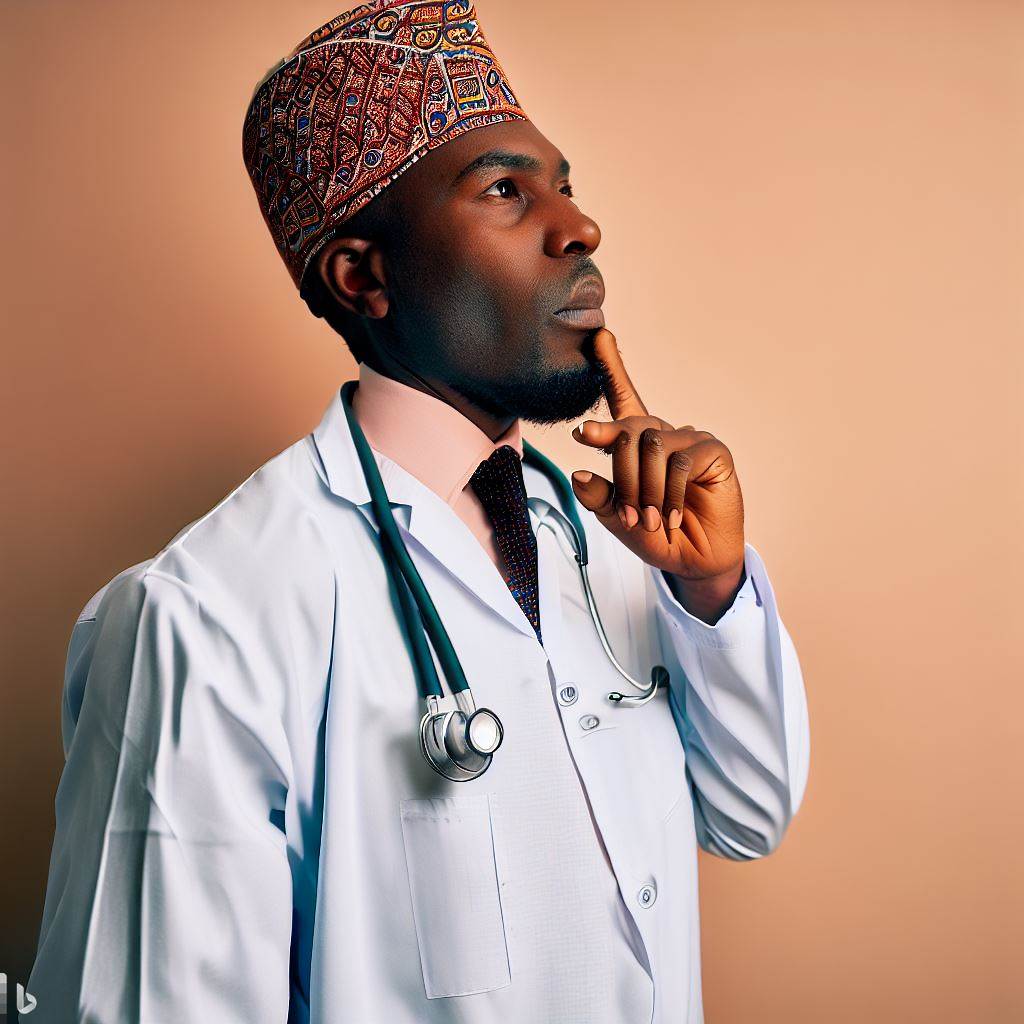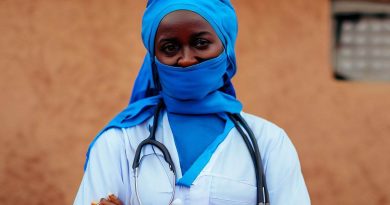How Nigerian Doctors are Combating Local Health Crises
Last Updated on September 24, 2023
Introduction
Nigerian doctors heroically confront health crises, making a difference in their communities.
However, numerous challenges plague Nigeria’s healthcare system:
- Inadequate Infrastructure: Insufficient healthcare facilities hinder effective medical interventions.
- Limited Access to Medical Care: Many rural areas lack access to essential healthcare services.
- Shortage of Medical Personnel: Nigeria faces a scarcity of doctors and healthcare workers.
- Infectious Diseases: Malaria, cholera, and other infections remain prevalent, requiring urgent attention.
- Maternal and Child Health: High maternal and child mortality rates demand specialized care.
- Insufficient Funding: Healthcare receives limited financial support from the government.
- Brain Drain: Many skilled doctors emigrate, leaving a talent gap in the country.
- Cultural Beliefs: Traditional beliefs sometimes lead to delayed or inadequate medical treatments.
Despite these challenges, Nigerian doctors demonstrate resilience and dedication, striving to improve the nation’s healthcare landscape.
The Role of Nigerian Doctors in Local Health Crises
Nigerian doctors face numerous challenges as they strive to combat local health crises. Despite limited resources and infrastructural deficiencies, they play a significant role in providing much-needed healthcare to the population.
In local health crises, Nigerian doctors act as primary healthcare providers, diagnosing diseases, prescribing medications, and performing necessary surgeries. They actively engage in health education and awareness campaigns, empowering communities to adopt preventive measures and hygiene practices.
Coordinating medical relief efforts, they collaborate with international organizations and government agencies to ensure effective emergency responses.
Engaging in medical research and innovation, Nigerian doctors contribute to developing new treatment methods and technologies to address specific health crises.
Beyond their medical duties, they participate in community outreach programs, offering free medical camps and health screenings to underserved areas.
Advocating for policy changes and reforms, they push for improved healthcare infrastructure and increased funding.
The commitment of Nigerian doctors extends to shaping healthcare systems and policies that effectively address local health crises.
Their dedication, expertise, and advocacy efforts contribute significantly to improving healthcare outcomes in the face of challenging circumstances.
Read: How to Start Your Career as a Process Engineer in Nigeria
Challenges Faced by Nigerian Doctors
Nigerian doctors face various challenges while combating local health crises:
- Limited resources hinder their ability to provide adequate healthcare services.
- Inadequate infrastructure, such as lack of proper medical facilities and equipment, poses challenges.
- The brain drain of healthcare professionals, who emigrate to seek better opportunities abroad, affects workforce availability.
- Insufficient funding and budgetary allocation to the healthcare sector limits their ability to tackle health crises effectively.
- Shortage of medications and essential supplies further hampers their efforts to provide quality care.
- Inadequate training and professional development opportunities hinder their skills and knowledge advancement.
- High patient load and overcrowded hospitals add to the burden faced by Nigerian doctors.
- Security concerns and the risk of violence in certain areas affect their ability to provide healthcare.
- Gender discrimination and lack of equal opportunities for female doctors hinder their progress and contribution.
- Mismanagement and corruption within the healthcare system undermine their efforts and lead to inefficiencies.
Additional issues that Nigerian doctors encounter include:
- Insufficient government policies and strategies to tackle health crises effectively.
- Disparity in access to healthcare services between rural and urban areas.
- Outdated medical equipment and technology impede efficient diagnosis and treatment.
- Inadequate staffing ratios and lack of support staff put additional strain on doctors.
- Emotional and psychological burnout due to the challenging work environment and relentless pressure.
- Resistance from traditional and religious beliefs that may discourage acceptance of modern medical practices.
- Inadequate public health education and awareness leading to a lack of preventive measures.
- Limited collaboration and communication between different healthcare sectors, hindering a coordinated response.
- Political instability and conflict exacerbate health crises and make it difficult for doctors to operate effectively.
- Legal and regulatory challenges, such as malpractice suits and bureaucratic red tape, further burden doctors.
Read: Nigeria’s National Sports Policies: An In-Depth Review
Strategies and Innovations Implemented by Nigerian Doctors
Innovative Approaches to Tackle Local Health Crises
- Developing partnerships with local communities to understand their specific health needs.
- Adopting a proactive approach by focusing on preventive measures rather than just treating illnesses.
- Utilizing technology, such as telemedicine, to reach remote areas and provide healthcare services.
- Implementing mobile clinics to bring medical care directly to underserved communities.
- Creating awareness campaigns to educate the public about common health issues and promote healthy behaviors.
- Empowering community health workers to provide basic healthcare services and follow up on patients.
- Integrating traditional medicine practices with modern healthcare to provide holistic treatment options.
- Establishing specialized units to address specific health crises, such as infectious diseases or maternal health.
- Collaborating with international organizations and foreign medical teams to leverage resources and expertise.
- Engaging in research and innovation to find locally adapted solutions for medical challenges.
Examples of Successful Initiatives
- Use of Mobile Clinics: Mobile clinics offer medical care to remote areas, ensuring access to vaccinations, check-ups, and treatments for underserved populations.
- Community Outreach Programs: Nigerian doctors conduct community outreach programs, educating about diseases, promoting prevention, and offering screenings for early detection. Effective community engagement helps address local health issues.
- Telemedicine: Telemedicine empowers doctors to diagnose and treat remote patients, breaking distance barriers and saving time in emergencies, crucially impacting lives.
- Integration of Traditional Medicine: Nigerian doctors value traditional medicine, collaborating with healers to offer comprehensive treatments, build trust, and respect local practices.
- Research and Innovation: Nigerian doctors drive research efforts, partnering with universities, research institutions, and global collaborators. Their studies yield evidence-based practices, advancing healthcare in Nigeria.
In general, Nigerian doctors are combatting local health crises with innovative strategies and initiatives. By adopting proactive approaches, utilizing technology, and collaborating with communities, they are able to reach underserved populations and provide essential healthcare services.
Successful initiatives, such as mobile clinics, community outreach programs, and telemedicine, have made significant progress in tackling local health crises.
Additionally, the integration of traditional medicine and active engagement in research and innovation contribute to comprehensive healthcare solutions.
Nigerian doctors continue to demonstrate their commitment to improving health outcomes and addressing the unique challenges faced by their communities.
Read: Challenges and Opportunities in Process Engineering in Nigeria

Collaboration with International Medical Organizations
- The partnerships formed between Nigerian doctors and international medical organizations.
- Nigerian doctors have established collaborations with renowned international medical organizations.
- These partnerships aim to improve healthcare services and combat local health crises.
- Organizations like Doctors Without Borders have been actively involved in Nigeria’s healthcare sector.
- The partnerships provide opportunities for Nigerian doctors to learn from international experts.
- International medical organizations offer technical support and resources to tackle local health challenges.
How these collaborations have helped in combating local health crises.
- The collaborations have enhanced the capacity of Nigerian doctors to handle health crises.
- International medical organizations bring innovative strategies and techniques to address local health problems.
- Joint efforts help in implementing effective preventive and treatment measures.
- Nigerian doctors gain access to training programs and workshops organized by international partners.
- Collaborations contribute to strengthening healthcare systems and improving medical infrastructure.
- Medical supplies and equipment are provided by international organizations, reducing resource constraints.
- Partnerships foster knowledge sharing and promote best practices in healthcare delivery.
- International medical organizations provide financial support for research and development initiatives.
- Collaborations enable swift response and coordination during disease outbreaks and emergencies.
- Health professionals from international organizations offer technical guidance and mentorship to Nigerian doctors.
- These collaborations also create networking opportunities and foster professional relationships.
- International partners assist in public health campaigns, raising awareness about local health issues.
- Partnerships facilitate the exchange of medical professionals between Nigeria and other countries.
- Collaborations foster a sense of global solidarity and collective responsibility towards addressing health crises.
- The expertise and resources brought by international organizations supplement the efforts of Nigerian doctors.
- Partnerships contribute to the overall development of the Nigerian healthcare system.
- Nigerian doctors gain exposure to international healthcare practices and innovations through these collaborations.
- The partnerships have led to advancements in medical research and the development of new treatment approaches.
- Collaborations help in attracting funding and support from international donors and philanthropic organizations.
- International medical organizations provide technical expertise to establish and strengthen healthcare policies and regulations.
Read: Process Engineering: Salary and Job Prospects in Nigeria
Improvements and Progress Made
The Nigerian healthcare system has witnessed significant improvements due to the relentless efforts of doctors
- Increased access to healthcare services in rural areas through the establishment of medical outreaches.
- Enhanced training and capacity-building initiatives to equip doctors with specialized skills.
- Improved infrastructure and medical facilities in both urban and rural areas.
- Strengthened collaboration between doctors, government agencies, and international organizations.
- Implementation of quality control measures to ensure the delivery of effective and efficient healthcare.
The efforts of Nigerian doctors have resulted in numerous success stories and positive outcomes in addressing local health crises
- Successful management and control of disease outbreaks, such as Ebola and Lassa fever.
- Reduction in maternal and infant mortality rates through improved antenatal and postnatal care.
- Effective treatment and prevention of common communicable diseases, such as malaria and tuberculosis.
- Improved vaccination coverage, leading to the eradication of certain vaccine-preventable diseases.
- Increased awareness and screening programs for non-communicable diseases, such as cancer and diabetes.
- Successful surgical interventions, including complex procedures and organ transplantations.
- Promotion of community health education initiatives to raise awareness about preventive measures.
- Provision of mental health services and support for individuals affected by psychological disorders.
- Implementation of innovative healthcare technologies to improve diagnosis and treatment outcomes.
- Efficient emergency response systems to handle medical emergencies and disasters.
With these accomplishments, it is evident that Nigerian doctors have made significant strides in combating local health crises.
Read: How to Become a Diagnostic Medical Sonographer in Nigeria
Conclusion
In summary, Nigerian doctors are actively combatting local health crises by addressing various healthcare challenges. They are implementing strategies such as awareness campaigns, community outreach, and telemedicine services to improve healthcare access and education.
Additionally, they are collaborating with international organizations and leveraging technology to strengthen healthcare infrastructure.
It is crucial to recognize and support these doctors in their efforts. By doing so, we contribute to a healthier Nigeria and a more sustainable healthcare system.
Acknowledging their hard work and dedication can inspire others to follow in their footsteps, ultimately leading to a society where everyone has access to quality healthcare.
Let us appreciate and assist Nigerian doctors as they strive to make a positive impact on healthcare in Nigeria. Together, we can help build a brighter future for the nation’s health and well-being.


